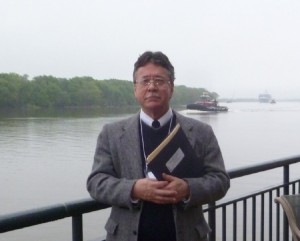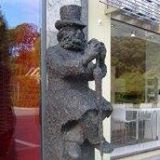
R.W. Haynes teaches at a university and writes about literature for academic publications. His doctorate at the University of Georgia (1991) was on sixteenth-century classicism in England. He has taught at Texas A&M International University in Laredo since 1992.
His teaching focuses on literature ranging from the Greeks to the English Renaissance, most of it dealing with medieval material and Shakespeare. Two more recent dramatists, Henrik Ibsen and Horton Foote, have been the focus of his attention in recent years. His book The Major Plays of Horton Foote (Mellen 2010) will be followed next year by an anthology of criticism on the same author.
Here at PLT we have had the privilege of featuring several of his poetic works both in classical & free style form. Intrigued by his background as well as his work in the field of poetry, we have included him in our list of special interviews at PLT, where I would like to begin by putting these questions. Hello RW welcome to our PLT interview. A few questions via Robin Ouzman Hislop Editor
PLT- Which was your first contact with poetry?
RW- Both of my parents were teachers, and both loved literature. My mother wrote poetry and encouraged her children to do the same. I had the honor of reading one of my mother’s poems at my sister’s funeral not long ago.
PLT- Which style in writing defines you?
RW- I’m not sure. It might be easier for someone else to answer that. There are some poetic projects I’d like to try which may be very different from what I’ve written so far. And does one write to be defined? Perhaps one writes to elude definition, at least at times. Remember what Hamlet says to Guildenstern, “Call me what instrument you will, though you can fret me, you cannot play upon me.” Not that I have any earth-shaking mystery in my poetic activity that it would be death to reveal. I do tend to work in more or less formal verse, which some editors and readers find insufficiently edgy or something. Different strokes. And not many of my poems have been long poems, possibly because of feebleness of mind. And sometimes the verse may be a bit angry, even though most of my sonnets are jokes to some extent. Well, anger demands expression, and, when it energizes a composition, that process governs the anger, I think, and wrath becomes something else, as it usually ought to do. To conclude the answer, I do what my Muse tells me to do, hoping all the while that writing about Downtown Waco or The Three Little Pigs or the Texas Campus-Carry legislation or the ghosts of people who aren’t dead yet isn’t some mad aberration arising from academic trauma or lack of tobacco or something.
PLT- Where is the germ of your creation? What triggers the poem?
RW- I join lots of poets in saying that the impulse to write is a constant presence. Perhaps it derives from a sense that language has a kind of magical potential to convey more in special moments than in ordinary ones. It isn’t always enough to yell “Caramba!” or to gasp “The rest is silence.” But let’s look at Shakespeare, whose sonnets show us something about how poetry does what it does. Can’t we say that in those poems there are motives we recognize with a distinct immediacy? Love, bitter disappointment, jealousy, humor, anxiety—all of which in their intensity are subjected to a presence of mind (if I may develop the usual sense of that phrase) and put before us as a kind of imaginative victory, if that is not too strong a word. So it seems to me that often the provocation to verse is a challenge to respond artistically to a moment deserving a poetic response. When the angel gives a command to Caedmon, he understands it is time for him to sing, despite his froglike voice.
PLT- Who were your educative poets?
RW- My mother, of course—Sarah Westbrook Haynes. My father also loved poetry. My older brother was, it seemed and still seems to me, a pretty good poet. Dylan Thomas, Pound, Eliot, Yeats. I majored in Classical Greek as an undergraduate largely because of Pound’s enthusiasm for Homer, but I also always read in the English poets, Chaucer, Spenser, Sidney, Donne. I liked the Romantics except for Wordsworth, whom I learned to respect at about the same time as I found I could read Wallace Stevens at last. I liked the work of a couple of poets, Marion Montgomery and Judith Ortiz Cofer, who were at the University of Georgia when I was there. Shakespeare finally became my job, and his work still amazes, and now as I write drama his skill seems even more unparalleled.
PLT- Do you handle an idea or an aesthetic intention when writing?
RW- I’m sure I try at times. Sometimes the ideas handle me. I won’t say the road to Hell is paved with aesthetic intentions, but I do think we need to reserve some modest disdain for glib or facile effusions that have nothing behind them but a kind of opportunistic exhibitionism. I like all kinds of poetry and poets, but not all poetry is equal in value. Do you remember Cinna the Poet in Julius Caesar? The crowd, infuriated by Caesar’s murder, seized him because one of the assassins was named Cinna. When he protested that he was a poet, the crowd tore him to pieces because of his bad verses. Perhaps the poet, like the blues musician, has to pay dues in one way or another before arriving at competence. On the other hand, youth, though sometimes blind or inconsiderate, can energize expression so much that impulse redeems immaturity and the claims of common sense appear pedantic. One doesn’t want to hear “I fall on the thorns of life!” every ten minutes, but Shelley’s “Ode to the West Wind” still opens a universe of poetic power.
PLT- What do you think of alternative resources for spreading poetical works?
RW- I’m for poetry, however access to it may be provided. Thank God for the Internet, which has done much to diminish the influence of certain kinds of editorial tyranny. I taught two classes today to begin the summer session, and in both I advised the students to write poetry, and I believe some of them took me seriously.
PLT- Do you think that poets, as such, have a special social commitment or that their sensitivity is more exposed to society´s predicaments?
RW- Life usually requires some toughness, no? I visited Poe’s grave in Baltimore a year or so ago, and, of course, it’s painful to reflect on gifted individuals whose artistic souls drive them through destructive experiences and social rejection. One thinks particularly of musicians, though the names of Hart Crane and John Berryman come to mind as well. It is good when such individuals find support and encouragement and can sustain life’s disappointments. Charles Baudelaire said that his humiliations were of the grace of God, and no doubt he derived comfort from that thought. As for social commitment, I’d like to think that a commitment to the pursuit of wisdom would suit poets very well. If we look at the political alignments of poets in the United States, I am sure that far more are Democrats than Republicans, but a review of history might indicate that such characters as the Beowulf poet, Chaucer, Spenser, and Shakespeare aligned themselves with political power to some extent, and no doubt the same was true of Homer. It was in fact reported that it was Caesar Augustus who prevented the posthumous burning of Vergil’s Aeneid. Now that was a patron of the arts. Despite these observations, however, it is also true that heartless greed and meretricious machination do not tend to promote poetic values. Though Lord Byron facetiously claimed to have discovered a new vice in avarice, his sponsorship of Hellenic freedom showed his true feelings. In so far as poets subscribe to humane values, to compassion and respect for their fellow humans, a social sympathy can be expected from them, but, surely, there is a considerable variety in human perspective. Would one expect an insurance executive such as Wallace Stevens to be a great poet?
PLT- Which was the last poetry book you read?
RW- I tend not to read books of poetry by individuals very often. I’m not sure why. It may be that I think I get more from works considered individually or in small groups than in a dense assemblage of poems. So the last book of poetry I read was probably Shakespeare’s Sonnets.
PLT- According to your criterion, what living poet should be re-read nowadays?
RW- Judith Ortiz Cofer, who is a native of Puerto Rico, but who has lived for many years in Georgia. Her work returns the reader to the personal by celebrating personal connections, the kind of sometimes casual devotion that shapes family and the caring individual. Those in search of new variations of insanity have many options, but Cofer’s poetry effectively engages a rare quest for an emotional responsibility which arises from a kind of harmony of verse and perspective.
PLT- Thanks RW for your amazing responses, I hope our readership following will be as profoundly impressed as I am. Also, I must admit, I’m a great fan of Wallace Stevens, him & Samuel Beckett in fact. And thank you again for your recommendation of Judith Ortiz Cofer, I’m intrigued, does she write in her original language, presumably Spanish? Could we entreat of you a sample of one of her works perhaps, and what that means to you and the title of any recommended publication.
RW- Judith Ortiz Cofer writes in English. A collection of her poetry is the volume Reaching for the Mainland & Selected New Poems, Bilingual Press 1995. Her poem “Esperanza,” which can be found at http://www.poetryfoundation.org/poem/240624 demonstrates her sense of the emotional implications of self-centered decisions. The young woman whose name means “Hope” is sketched in a few devastated lines as a person whose hope was cursed at her birth.
PLT- It wouldn’t be fair to wrap this Interview up without some further reference to your works other than those hitherto published here at PLT. So would you be so kind to leave us with one or more, perhaps a favourite of yours, if such a thing is possible.

The Peacock Lady’s Declaration
The lady with glasses put her crutch aside
And said, “I get so sick of parasites
Who think that what a real writer writes
Just kind of bubbles up neatly from inside,
As she stares off in space, then grabs a pen
And puts together a story like a box
With little hinges, snaps, and locks,
And then goes back and puts the symbols in.
Of course, parasites are necessary,
And some of them are pleasant enough to be
Good company, at times, but mortality
Shouldn’t be orderly, at least not very;
Writing here, with these crumbling bones,
Makes new life sprout between inanimate stones.”
The Tomb of Edgar Poe (2014)
Looking for the conference hotel,
I drove by Poe’s grave. Tap tap…
One should definitely shudder a little
At a contact so nearly missed.
Later I walked back, passing by
The Everyman Theater, colder
Than I’m used to being, tap tap,
Down home on the Rio Grande,
And on his stone a twisted wreath
Of pasts and half-recalled regrets,
A ribbon, a spoon, a ball-point pen,
Declare our junkie solidarity again.
Why wasn’t some demented witch
Out front pouring green lemonade?
A lean, blue owl on her shoulder perched,
Staring as though I, too, were cursed.
Tapped out, forget that dark flower,
Return to harbor past the Bromo-Selzer Tower.
R.W. Haynes
robin@artvilla.com
PoetryLifeTimes
Poetry Life & Times
editor@artvilla.com
www.artvilla.com
Artvilla.com

